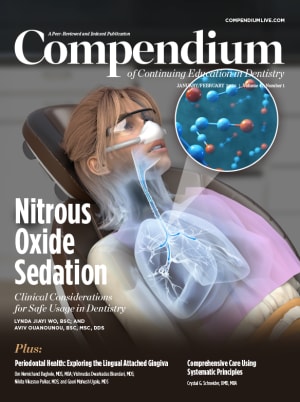Straumann BLT Ø2.9 mm Implant: A Versatile Solution for Narrow Space Indications
With implants being increasingly accepted as a standard of care for predictable tooth replacement in edentulous spaces, manufacturers such as Straumann are focusing on enhancements to increase the overall strength of the implant, even at smaller diameters. The development of small-diameter implants, comments Thomas Sterio, DMD, MS, has provided dental surgeons with an alternative for treating patients with reduced interdental space.
"The Straumann® Bone Level Tapered Ø2.9 mm Implant is specifically indicated for the reduced interdental space of the lateral maxillary and mandibular incisors," Sterio says. The implant, he notes, can serve as an excellent alternative when there is inadequate space for a conventional (eg, ≥3.3-mm) implant, and its use can help avoid the need for alternate types of restorations such as bridges or removable dentures.
The company's Roxolid® high-performance alloy, combining titanium (85%) and zirconium (15%), provides excellent tensile and fatigue strength. Smaller implants, Sterio affirms, increase the range of treatment options available to clinicians, and a less invasive approach may help improve patient acceptance.
The Massachusetts-based practitioner, who is an experienced periodontist, remarks that a number of 3.0-mm diameter implants have been introduced to the market, in both one- and two-piece designs. The one-piece implants, he advises, are technique-sensitive and offer challenges restoratively, while most two-piece 3.0-mm implants are made of either a commercially pure titanium or an alloy.
"The Straumann Ø2.9 mm Roxolid offers increased strength, ease of placement, and even greater surgical versatility than a conventional 3.0-mm implant," he says, noting that the 0.1 mm narrower width makes a significant difference in many instances. "Also, the implant's bone-level platform enables more versatility and ease restoratively than one-piece designs, and its apically tapered shape is designed for increased stability and avoidance of surrounding structures."
In addition, the SLActive® surface featured on Straumann implants, Sterio says, facilitates faster osseointegration* and the implant stability curve shifts from mechanical primary stability to secondary stability sooner. "This allows the surgeon to select an implant with a smaller diameter or length if anatomical limitations warrant it and still have the confidence that the fixture will withstand functional load with a reduced healing time," he asserts.
These enhancements in surface technology and platform design, as characterized in the Straumann BLT Ø2.9 mm implant, along with the integration of cone-beam computed tomography (CBCT) and digital impressioning in the planning process, Sterio says, make it possible to place an implant "with a high level of precision, low risk to the patient, and a great degree of soft- and hard-tissue preservation. Being able to combine digital imaging and impressions allows for high predictability in treatment planning."
According to Sterio, Straumann understands the importance of working with the practitioner to ensure successful implementation of the implant. "Straumann has done a wonderful job releasing the Ø2.9 mm implant and coaching restorative and surgical dentists on how to best utilize it," he states. "My local representative spent a significant amount of time with me explaining its features, the components, and the technique for surgical placement and postoperative management of the fixture." He adds that if a new restorative clinician collaborates on a case with the surgeon, the Straumann representative will educate the clinician on the restorative protocols and specific components for the implant.
Use of this implant helps make implant therapy predictable, Sterio submits. "After all," he concludes, "dentistry is about providing the patient with a great experience and an excellent outcome."
Straumann
800-448-8168
twonine.straumann.com
